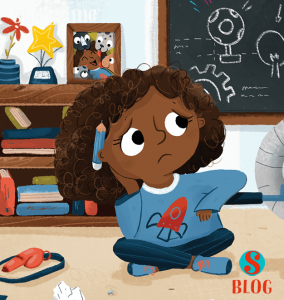
Happy New Year everyone! We hope 2022 will be an exciting year to us all! We thought we would kick start it by inviting some guests to our blog this year! We work with some amazing people – and have some lovely friends creating stories all over the place. So we decided to ask them to share thoughts, ideas and stories with our readers and hopefully, we will learn a lot of new things too!
 This month our guest is the writer, artist and master storyteller Nick Abadzis. Over the course of his career, he has written for Marvel and DC Comics, created a series of amazing children’s books (Pleebus Planet) and even written for the Bob the Builder TV series. In 2007, he released a graphic novel called Laika, about the first dog in space. It won an Eisner award and several other international storytelling prizes. He recently teamed up with Academy Award-winning director Asif Kapadia to create a ground-breaking ‘extended reality’ film about Laika, which takes viewers along on the dog’s trip into space.
This month our guest is the writer, artist and master storyteller Nick Abadzis. Over the course of his career, he has written for Marvel and DC Comics, created a series of amazing children’s books (Pleebus Planet) and even written for the Bob the Builder TV series. In 2007, he released a graphic novel called Laika, about the first dog in space. It won an Eisner award and several other international storytelling prizes. He recently teamed up with Academy Award-winning director Asif Kapadia to create a ground-breaking ‘extended reality’ film about Laika, which takes viewers along on the dog’s trip into space.
Nick can tell stories in any format – he has written graphic novels, scripts, fiction, non-fiction and he even does voiceovers… so he REALLY knows what stories are made of! People often ask Nick for advice. In this blog, he agreed to share his wisdom with us. If you love stories as much as we do, you will be fascinated to read about the secrets of a great storyteller! We hope it will also prove inspiring to any readers who dream of writing their own tales.
What Makes A Good Story?
No-one in the world is interested in hearing a bad story, or rather, a poorly told one. There are a lot of good stories out there, so perhaps the question should really be, “What makes a great story?” What makes a story so compelling and unique that you just have to hear it, want to read it, need to watch it?
Storytelling is something all human beings do, whether it’s a casual gossip, a joke to warm up a room or conversation to exchange information. That’s the great advantage evolution gave our species – language, via which we can co-operate, plan, compete, persuade, convince and inspire.
Conversation itself takes many forms – from discourse to dialogue, diatribe, debate and discussion – and is both simple and beguilingly complex. It can be straightforward or it can be sophisticated, it can be weaponised or it can be immersive, generous and transformative.
Storytelling, as a function of human communication, also takes many forms and is inherent in human beings – it, like language itself, is hardwired into us. Like conversation, it is infinitely malleable and is one of the oldest technologies human beings possess, older even than fire.
 In that sense, we are all experts. We all know what we like. We might not all know when we are being lied to, but we do know when we are intrigued or entertained by a story. We all have an instinct for storytelling. There is no greater truism than, “It’s the way you tell ‘em,” whether it’s a politician on TV selling an idea, a dramatist convincing a producer to put on her play or simply a parent telling their child a good bedtime story.
In that sense, we are all experts. We all know what we like. We might not all know when we are being lied to, but we do know when we are intrigued or entertained by a story. We all have an instinct for storytelling. There is no greater truism than, “It’s the way you tell ‘em,” whether it’s a politician on TV selling an idea, a dramatist convincing a producer to put on her play or simply a parent telling their child a good bedtime story.
What we all want to know is, how do I make a good story great? How do you tell a tale that cuts through all the chatter that simply must be heard by those whose attention you capture with that vital first line? If you capture one person’s attention and they like your story, they will spread the word, via conversation, via recommendation, via social media, and before you know it, you have an audience. Capturing their attention is one thing, holding onto it quite another. There are so many skills to master in storytelling.
Marshalling one’s own desire to be a storyteller or writer of any kind is a brave thing to do. Like any endeavour, it begins with a single step – a decision to do it, to embrace the idea and decide to live with it; to become it and make it a part of you. A beginning or a change of any kind takes courage.
Now you just need some ideas to develop.
 One of the questions that professionals will tell you they regularly get asked is, “Where do you get your ideas from?” It’s a question that’s often derided as banal, daft, simplistic. It is, however, a question that articulates the basic uncertainty and curiosity that lies at the root of all storytelling, whether poor, good or great.
One of the questions that professionals will tell you they regularly get asked is, “Where do you get your ideas from?” It’s a question that’s often derided as banal, daft, simplistic. It is, however, a question that articulates the basic uncertainty and curiosity that lies at the root of all storytelling, whether poor, good or great.
For me, the short answer to where my ideas come from is that I make them up. I have a Muse who, if she is in a good mood, supplies them to me. The longer answer is that they come from observing the world, observations and insights being the raw material that then gets processed through my own highly individual, internal filter of creativity. This is your greatest creative asset: no one sees or experiences the world how you do and if you have a manner of expressing yourself in a way that connects with people, you’re already on your way.
What makes a good story? You do.
In the end, it’s all you. A story becomes good by simply telling it once, twice, more, by experimenting with it, stretching it, reshaping it. As we all know, any story changes when retold in conversation – it gets embellished, events get reordered for dramatic or humorous effect, the tone of it can change according to your listeners’ reactions. It changes again once you write it down or begin illustrating it.
Stories are mutable, flexible, elastic. By telling your story seriously, or by telling it humorously, by choosing a method by which to tell it or frame it, you’re already crafting it in your own unique way. If you’re starting out as a writer, a storyteller or narrative artist of any sort, finding your own voice is the most important thing you’ll ever do.
Thing is, if you tell yourself that, it can be daunting, so it’s just as important to play. Don’t set yourself impossible tasks before you’ve fooled around a little and had some fun. Try telling yourself a deliberately bad story to see what happens.
The stories you like are not just signifiers of your own tastes, they’re signposts to the kinds of tales you’d like to tell. They’re clues to the path of your own creativity and your own good stories. Follow them.
On your way, always remember that mantra: What makes a good story? You do.
A good story is an artefact of sorts, whether constructed from words or imagery. It’s a coral skeleton of impressions, embers of a campfire left by a narrator who once stayed there into which you breathe new warmth with your own mind and imagination.
Finding your own sense of confidence shouldn’t feel like climbing a mountain in a day; it should feel like exploring it, camping on it, noting the changes in weather from the base to the craggiest peak. One day, if you get to know it, you’ll wake up and find that you have the confidence to push forward, to scale that mountain to the top and maybe see what’s beyond.
That way lies the land of the exceptional storytellers.
Nick writes about his books, storytelling and many other subjects on his blog, which you can find here: https://www.nickabadzis.com
You can also buy his books by following the links on this page: https://www.nickabadzis.com/test




